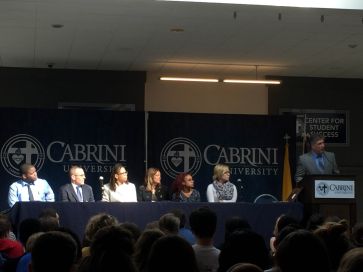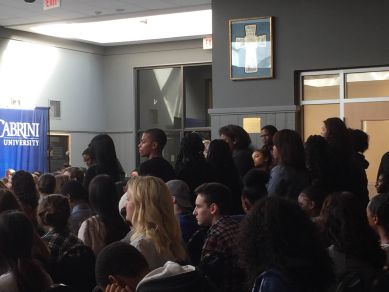A panel discussing the summer common read “Letter to My Son” by Ta-Nehisi Coates was suddenly interrupted by student protestors from the Black Student Union (BSU).
“What inspired the protest was the fact that we [BSU] were not involved. This [essay] is something that talks about race and we should be involved. All minority clubs on campus should be involved,” senior BSU member Marketa Johnson said. “BSU took it upon themselves with assistance from Stephanie Reed and other faculty and staff advisors just to put something together to make ourselves heard and tell the panel what we want. It’s not fair to us that people are making decisions for us and not asking us what we want.”
“Letter to My Son” is a personal and insightful piece about what it is like to grow up black in America. Coates’s letter is written to his 15-year-old son about the African American experience and what they go through every day in the United states.
Cabrini requires a common summer reading for each incoming freshman class to “create a sense of community and foster a deeper understanding of the human experience,” Dr. Mark Kiselica, dean of the school of humanities and social sciences, said in his address to the students.
“The biggest minority issue that we see is that we are not being heard at all, so we have to do stuff like this to get attention and we don’t want to seem like the bad kids that want to get attention but we are not being heard enough so we have to give our protests,” Johnson said. “We have to stand in the middle of a panel that is directed by somebody that doesn’t even know about the African American experience.”
“I think we needed that. I think it was a wake up call for them [the panel] because we are still addressing the issue really lightly. We are not addressing the issue to its full capacity,” freshman business management and English major Fabrine De Oliveira said. “I felt underrepresented on that panel. Where’s the Hispanic? We are a minority as well. There were enough whites on the panel.”
Panel members included the two freshman essay winners, Grace Duncan and Gabrielle Johnson; communications professor Margaret Rakus; junior history and education major Treci Butler; education professor Dr. Angela Campbell and business professor Patrick Duthie. Dr. Joseph Fitzgerald, who works within the black studies major, moderated the discussion.

Cabrini University’s message of education of the heart and helping the common good is a theme that students engage with both in and out of the classroom. However, it appears that some students are not appreciating the message and opening their minds.
“It appalled me when we were talking about it in class because I am Hispanic myself but my dad is black so the things that have been happening to African Americans, my dad is prone to those things, so it specifically affects me as a person,” De Oliveira said. “So to think that there were a lot of students in my class that attacked the author that said, ‘I have not idea where he is coming from and I will never witness those things and I will never go through those things.’ But you can still empathize and that’s part of learning, that is part of growing up.”
“I think my views and opinions in class aren’t as appreciated as my fellow caucasians,” she said. “Sometimes I raise my hand and my hand just stays up. It’s not even acknowledged. I am here paying for my education just like everyone else so I don’t understand why it is like that. I feel that I am being treated differently just like African Americans.”
One of the goals BSU is trying to accomplish is more diversity training for teachers.
“We are looking to say what our life is. A teacher cannot tell me what my life is, or what life I live or where I come from,” Johnson said.
“They are supposed to be these people of higher power and supposed to be teaching us on leadership and teaching us on this and teaching us on that, but they’re failing when it comes to equality,” De Oliveira said. “The things that are being talked about in the news about racial inequality is being done to us by them, so you can’t say it’s not true, you can’t say it’s not happening when it is clearly happening on our campus and in our atmosphere.”

BSU is not just looking for equality among African Americans, but for all minorities on campus.
“We are looking to achieve minority comfortability. So I don’t want to feel like a minority I want to feel like a regular American,” Johnson said.
Over the past year, Cabrini’s minority population has gone up to about 33 percent and the school prides itself on being a diverse institution. However, that is not how some minority students are feeling.
“We need more peace pole meetings for minorities period. We have enough for people who overdose. We have enough meetings of killings of here and there and that person, but there is never a minority in the email ever,” Johnson said. “That is something we want to change. We want to see that for incoming students so that they can feel comfortable. If you expect to have more black students, more Latino students, more Asian students, any student that is a minority if you don’t implement things that involve them first?”
Being ignorant to topics such as racial inequality is a real-world issue and is something that is happening now. Almost every week there is a report on an African American being killed because of their skin color.
“I think even with panels like this they [non-minority students] are saying, ‘I can’t wait to leave; this is taking too long.’ No! This is real, but it’s still not getting to the people that it is supposed to be getting to because it is not affecting them,” De Oliveira said. “Unless they are specifically victimized then they seem to not care and that’s a continuous problem. When is that gonna stop?”



